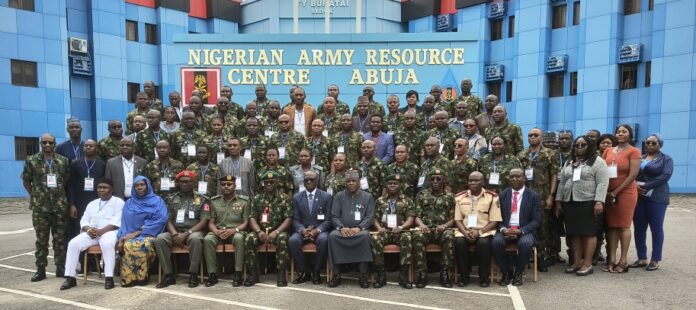The National Security Adviser (NSA), Malam Nuhu Ribadu, has emphasised the need for financial institutions to be in the frontline
By Suimaila Ogbaje
The National Security Adviser (NSA), Malam Nuhu Ribadu, has emphasised the need for financial institutions to be in the frontline in the fight against terrorism financing as part of Nigeria’s counter-terrorism efforts.
Ribadu made the call at the 3RD Counter-terrorism and Counter-insurgency Seminar organised by the Nigerian Army Resource Centre (NARC), in Collaborations with Office of the National Security Adviser (ONSA0, on Wednesday in Abuja.
He was represented by the National Coordinator, National Counter Terrorism Centre (NCTC), Maj.-Gen. Adamu Laka, at the event.
Ribadu said that terrorism was not just spurred by extremist ideology but also by the financial lifeblood that enabled the terrorist groups to carry out their heinous acts.
According to him, without funding, the ability of terrorist organisations to recruit, train and execute their plans is severely weakened.
“It is for this reason that the fight against terrorism financing is as critical as any military or law enforcement operation in Nigeria, like many other nations, faces significant challenges in this area.
“The complexities of our financial landscape combined with the adaptability of terrorist networks means that our financial institutions are often on the front line of this battle.
“It is crucial, therefore, that we optimise our efforts to ensure that these institutions are well equipped to detect, prevent and report suspicious financial activities that could be linked to terrorism.
“Nigeria, as a member of the international governmental Action Group against money laundering in West Africa aligns its anti-money laundering and counter terrorism financing efforts with global breast practices”, he said.
The NSA said that the supervisory authorities played critical roles in optimising financial institutions efforts to counter terrorism financing by establishing the regulatory frameworks and guidelines that financial institutions must follow.
He said there was also the need to conduct regular assessments and audits of financial institutions to ensure compliance with anti-money laundering regulations and adopt a risk based approach focusing on institutions more susceptible to exploitation.
According to him, supervisory authorities have the power to enforce penalties, fines or other sanctions on financial institutions that fail to comply with anti-money laundering regulations.
He said the Financial Action Task Force set up by ONSA had provided guidelines that we must be adhere to, urging financial institutions to be vigilant and proactive in their compliance efforts.
The Director-General of NARC, retired Maj.-Gen. Garba Wahab, said the strategic level counter-terrorism and counter-insurgency seminary was not about tactical issues but about agencies and organisations involved.
Wahab said that the ability of the agencies to trace and stop terrorism financing would do so much in stopping or preventing the scourge.
He said that without support from the local populace to and financing for the terrorists and insurgents, terrorism would not have taken over most of the space.
When push out ungoverned spaces, there is no space that is not governed. When you say ungoverned space, it means there is no lawful order, lawful agency in charge of a particular place.
“Unfortunately, in Nigeria, majority or most of our economic activities are on the informal sector and it is cash based, so which really assist terrorists and insurgents in their finances.
“We exchange money but most of the developed nations depend on digital transactions which we are still grappling with.
“We are afraid of fraud on the digital space and that has assisted terrorists and insurgents in their activities.
“That is the reason why we call organisations like NFIU, EFCC, Central bank of Nigeria to look at how we can find a way to mitigate the issue of financing of terrorism and insurgencies,’’ he said. (NAN)




